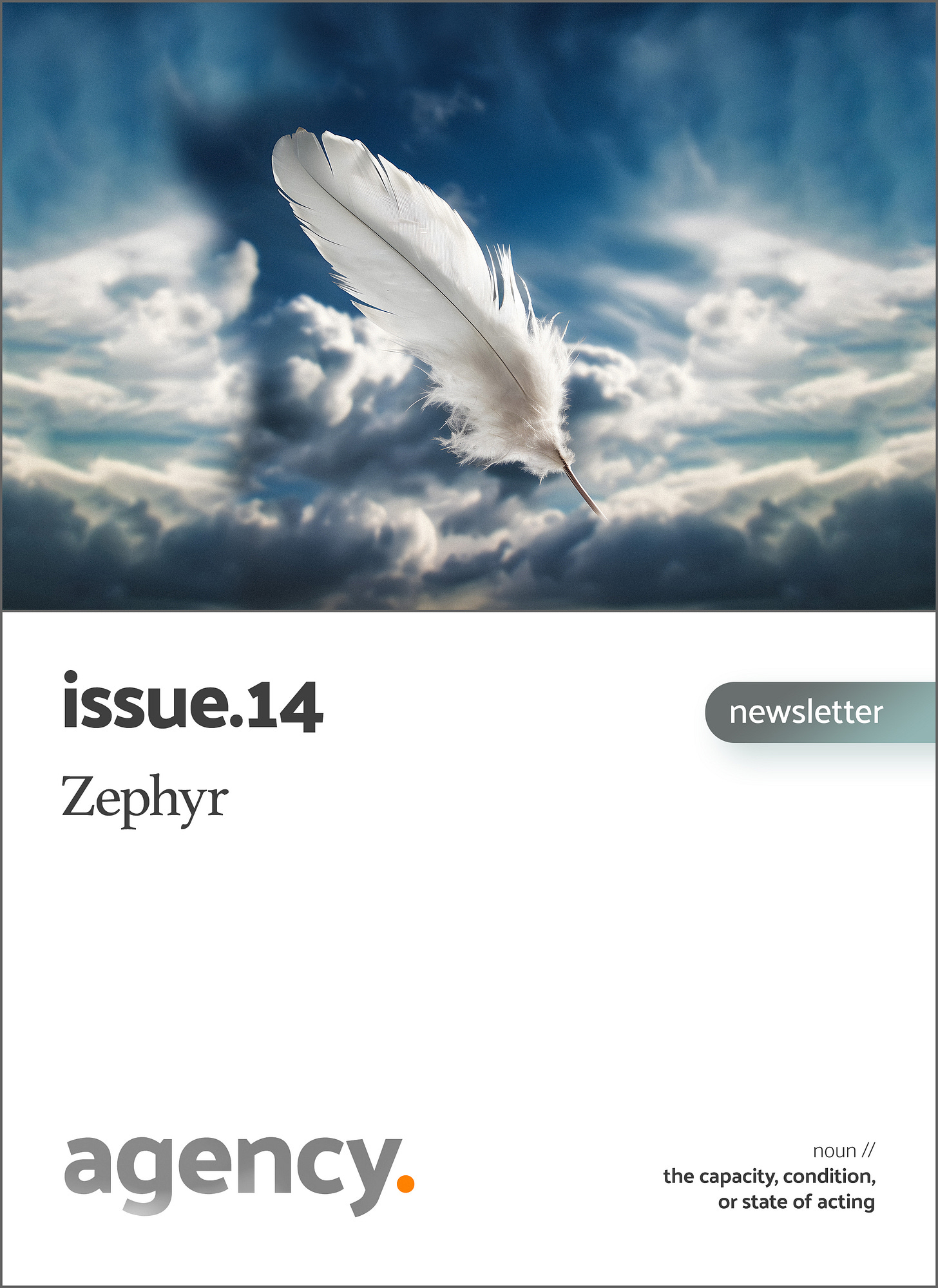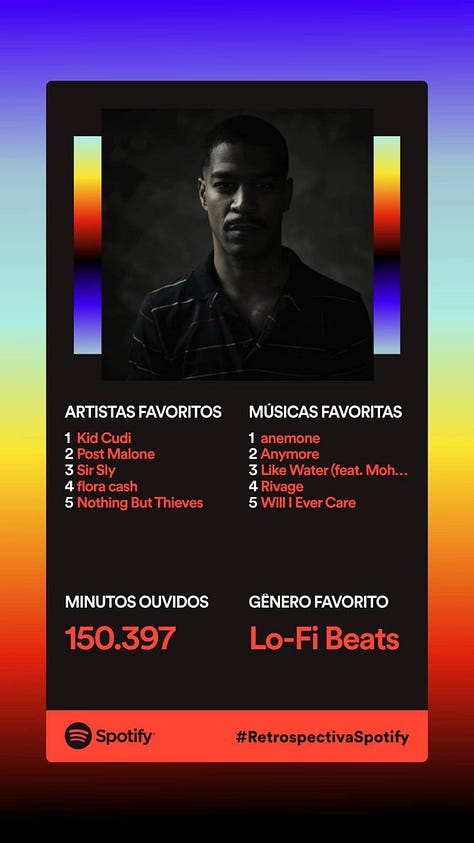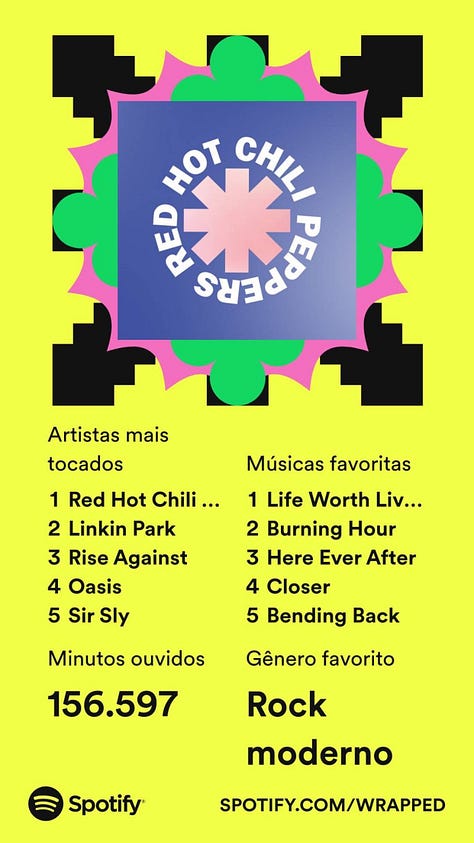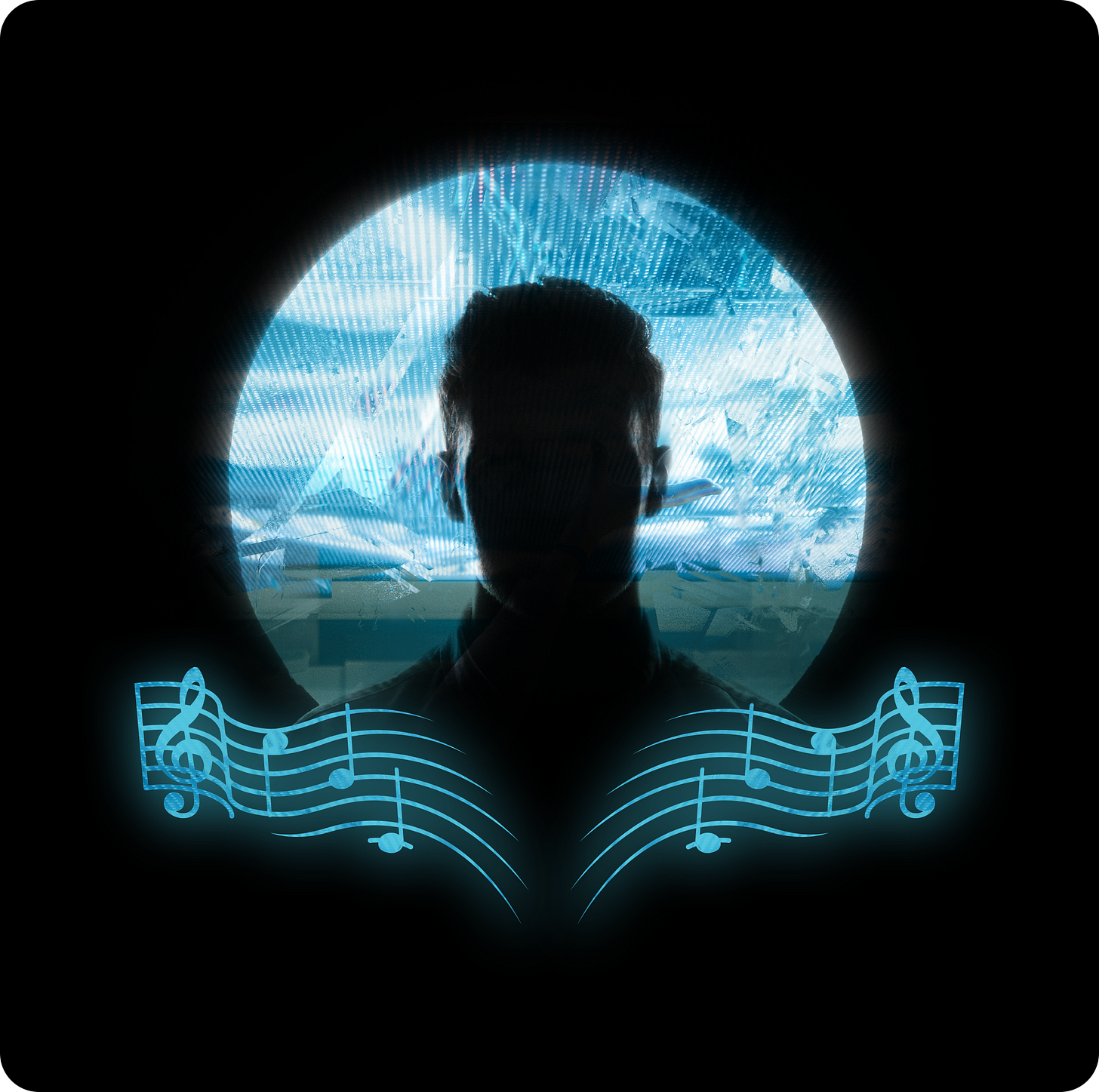
14. Introduction
I rejoice in musical harmony to meet you once again, Reader.
“And those who were seen dancing were thought to be insane by those who could not hear the music.”
Nietzsche said a lot of pessimistic and sad things throughout his life, but this quote brings forward an inquisitive paradox that may very well survive all proofs of time.
This won’t be your usual issue.
It’s also quite a long read, but I hope you stick around to the end.
It starts weird but grows in intensity.
Like some good music.
Because that which is new, strange, unfamiliar, mysterious, or uncommon is not necessarily bad or good.
It represents a new and neutral discovery that is ready to be evaluated, judged and further adopted, or discarded.
That is what we call “value judgment”.
David Hume, a Scottish philosopher from the 18th century, argued that value judgments are not objective or logical, but rather subjective and based on individual preferences and emotions.
This essentially means that In Hume's view, moral or evaluative judgments are based on our individual passions and desires, rather than on any objective reality.
Having that in mind, I shall kickstart the Zephyr issue, which is about music as much as it is about a gentle and warm breeze since sound waves transit in the air.
Can you feel or hear it already?
The term "zephyr" comes from the Greek god Zephyrus, who was the god of the west wind. In mythology, Zephyrus was often depicted as a gentle and benevolent deity, and his wind was said to bring flowers and other signs of spring.
🌬️🍃
14.1 Objective Reality
For the right eyes.
The first time I saw these graphs, they objectively (through fresh data and science) confirmed many different hypotheses I had about the reality around us.
It was first seen on the Not Boring Substack by Packy McCormick, specifically in the Weekly Dose of Optimism #40
An axiom is a statement or proposition which is regarded as being established, accepted, or self-evidently true.
And we can all agree that the information we consume dictates how we see the world around us.
Society mostly consumes information through social media nowadays, but news and journalism are the main sources of factual information, the true goal of a journalist is to be the vehicle between the actual facts and the neutral and objective truth but that is not happening as it should.
The graphs above analyze, through AI (Transformer language models), the overall feeling that the headlines have been transmitting to us throughout the last two decades.
We can see that negative sentiments like sadness, fear, anger, and disgust have been aggressively growing in predominance.
Why? Because they sell more. They capture attention through anxiety induction and generate profit through advertisements.
Whereas, optimistic and neutral headlines have been seeing a decline ever since. (This was before COVID-19, can you only imagine how these numbers would look today?)
This essentially means that the information that arrives at us has already gone through the value judgment of other people and institutions. They are biased when they shouldn’t be in the first place.
This lack of neutrality creates a dangerous and worrying dichotomy where, as an immediate result, we see a polarity of extremism in opinions, driving people to extreme actions, hatred, lack of inclusivity, and suppression of minorities.
An electrical engineer would say that opposite charges attract each other, making their forces act in the same direction
That could be called the Law of Attraction.
In science, it regards Electromagnetism.
In philosophy, it suggests that positive thoughts bring positive results into a person's life, while negative thoughts bring negative outcomes.
In psychology, Carl Jung would say:
When someone exhibits one-sidedness, it is an indication that they lack cultural refinement or sophistication and that they may be acting in a manner that is primitive or uncivilized.
In other words, he suggests that a failure to consider multiple perspectives or to embrace complexity can be a characteristic of uncivilized or barbaric behavior.
This is our objective reality on the date that this issue is published, it is bipolar and regardless of the scientific data presented above, it might be neglected because as Hume said, a value judgment is based on individual preferences and emotions.
Suddenly, someone yells in anger out of nowhere: “Who is to blame for letting such a reality unfold?”
Blame?
Absolutely no one is to blame.
Delegating blame and criticizing is an easy shortcut to absolve yourself from the responsibility of taking action.
Zephyrs flow in a gentle breeze and creative momentum because trying to find an antagonist, delegate guilt, and blame humans for being imperfect or thinking differently is counterproductive and pointless. It’s like trying to put out a fire by pouring gasoline into it.
There is absolutely no time whatsoever to think about accountability if we are too busy thinking about creating sustainable solutions to solve unsustainable problems from the meta-crises all around us.
The Return of Reinhardt - Short Tale About Leadership
On the ground, Reinhardt seemed to have regained his awareness of what was going on. In a full echo of confusing sounds and blurred vision, a high-pitched scratch roared around his mind as dust and shrapnel scattered in all directions. The pulse grenade had exploded near his trench and the impact of the explosion knocked him down and sent his helmet flying straight into a column that shattered into pieces with the impact.
As he regained his hearing, he began to hear the sound of gunfire, orders to retreat, and explosions. He came to the immediate conclusion that his end had arrived sooner than he had ever expected.
In a moment of hyperfocus, everything around him froze and he started to remember the reason why he had joined Porpax, he glimpsed the memories with his daughter, and he revisited a moment of his childhood when life was light, peace reigned between empires and the people abounded with fortune and mutual support. In a mental backflip, he went from the past to the future and began to envision the ensuing, cold dystopia he was about to let form if he didn't resist the enemy's surprise attack on his platoon, which was holding a key geographic position in that conflict between empires.
Seized by a defibrillatory shock to the heart, he flashed back to the present, regained his balance, and knelt with one fist on the floor as he clenched and unclenched the other in front of his eyes, feeling the most complete control of every nerve ending in his body, his heartbeat increasing in rhythm and his adrenal glands releasing a strong dose of adrenaline through his bloodstream which made him feel all his lifetime training come to head. In an instant, he looked around and mapped out his strategy for the next few moments, but before acting, he looked down and closed his eyes.
Everything went pitch black, the sound of gunshots stopped and music began to play with the greatest harmony he was ever able to feel. Taken by a profound cathartic inspiration, he opened his eyes and saw thousands of musical notes of all sizes floating around that scene of conflict as they radiated the purest tones of cyan blue.
In an agile ascent, he took the deflector shield staff from his downed colleague's hand, activated the device, and a semitransparent blue diamond-shaped barrier appeared on his arm. With his torso bent, he started trailblazing through the trench, crossing a treble clef and other notes as he dodged obstacles with the most agile of the kickturn jumps.
He climbed the slope at the end of the trench and on one side, saw his allies retreating through the streets of that city dimly lit by flames while on the other he saw an open field with different squads of enemies advancing in complete synergy a few yards away. He immediately knelt and rooted himself to the ground like a stone colossus, covering his entire body with his shield and starting to receive countless shots that were reflected and turned into more and more musical notes on impact.
He closed his eye one last time and causing an anomaly in time, he completely immersed himself in the music, floating through those words in the dimension of his mind.
"And now, the end is near and so I face the last act, my friend, I will speak plainly, I will state my case, of which I am certain, I have lived a full life, I have traveled any and all roads, and more, much more than. that, I did it my way."
As he delved deeper into that trance, Reinhardt completely lost himself in that perfect symphony. The saxophone sound intensified, the horn sounded velvety, the piano sounded comforting and his heart was strengthened with the courage of all the musicians that ever lived while pushing any fear aside.
"Regrets, I have a few, but on the other hand, too few to name, I did what I had to do, and I kept doing it without exception. I planned every course laid out, every careful step along the trail, yes, there were times, I'm sure you knew, when I bit, more than I could chew, but most of all, when there was doubt, I devoured and spat, faced all of that and I stayed on my feet, and I did it my way."
He felt as if his life had reached the moment of purest, lightest unity, for all he could have done, he did. He knew in his core that those he tried to save were saved in the end, those he tried to love felt loved at last, those he tried to satiate felt relieved in the end, and those he tried to teach learned beyond equal.
Time passed like a broken clock and with his eyes still closed, he couldn't tell if he would live that song forever or if when he opened his eyes, he would have to face his end.
As the song ended and the vocals of Frank Sinatra faded, he remembered that track was just one of several that lived inside the many records that inhabited his heart. He opened his eyes and all the musical notes around him flickered one last glow before disappearing completely, revealing his surroundings and making him realize that a lot of time had passed. He looked around and saw that no more enemies remained, for, in a complete act of inspiration and honor, his platoon had made a formation around him and resisted the attack by eliminating all threats.
Reinhardt was back.
14.2 Zephyrs
And some hermeneutics behind song lyrics.
*Exhales
Phew.
That story sets the stage and instrumentals for the main topic of this issue.
MUSIC!
Someone once said:
“Music is a moral law. It gives soul to the universe, wings to the mind, flight to the imagination, and charm and gaiety to life and to everything”
Thanks, Plato!
The concept of a Zephyr is intrinsically related to music because, in times of uncertainty, obstacles, crisis, and chaos in the external world, we all need to find our own source of inner peace and inspiration in order to keep moving.
Your favorite music tracks are your true armor against distraction, pessimism, and lack of ideas because they represent the history of real human beings who translated their existence into musical compositions.
These heroes pursued the dream of telling their stories and exposing their past through songs in order to make people feel represented, to make people… dance, jump, cry, scream, rise… LIVE!
In fact, the first musician I will bring to this issue is the most ABSURD example of human resilience in music that I could think about.
Any person that is familiar with the internet knows this British singer or has come across a very specific music video he made at the beginning of his career.
He became a global phenomenon in the 2000s due to the rise of internet memes. What we once called internet trolls started posting links to what they claimed was a "secret" or "exclusive" video or piece of content online. When users clicked on the link, however, they were instead directed to the music video of this singer, being forever… Rickrolled.
By now you probably already know who I’m talking about.
Rick Astley
And the true resilience of an artist.
1.053.941 Followers on Spotify
6.662.714 Monthly Listeners on Spotify
At a given moment you decide to pursue a musical career.
You launch a couple of songs but nobody really cares about them.
Until suddenly… your last track becomes a global hit.
Not necessarily because it is good, but because people all around the world turned it into an internet meme and mocked it.
What would you do, Reader?
Travel back in time and stop your past self from ever making that music?
Listen to a critic that says: “He is not made for this, he should change careers” and give up on your dream?
Of course not.
You listen to the title of your own music and rhythm.
YOU NEVER GIVE IT UP.
Three decades later, there you are, fighting the good fight and producing some passionate gospel pop.
Rick Astley is a contemporary genius for his persistence.
Bravo Mr. Astley, you are eternal.
Hope is for the hopeful
It's a dream that never dies
Faith is for the, faithful
I see it in your eyesAnd I got angels on my side
I got angels, flying high
And everything gon' be, alright
'Cause I got angels on my side
Seriously, can you quantify how optimistic are these lyrics?
'Cause it's hard to keep those promises
I made when I was strong
Now I'm haunted by the ghost of you
And I can't turn the lights out now
How nearly impossible can it be to sing about a broken heart with a crescendo of hope and energy?
Led Zeppelin
And the hymn of Rock’n’Roll
13.310.425 Followers on Spotify
18.638.061 Monthly Listeners on Spotify
It wouldn’t feel right to approach the genre of Rock without first talking about Led Zeppelin.
It’s approximately the 1950-60s and we start to see a new genre taking form and combining genres like blues, country, and gospel in venues, bars, and ballrooms mostly around the US and UK.
This amalgamation of rhythm and instruments started being called “Sessions of Rock and Roll” to describe exactly what it represented: “to shake up, to disturb or to incite movement”.
Fast forward to 1970.
Robert Plant, the frontman of the legendary English rock band Led Zeppelin was sitting by a fire in a cottage in the English countryside, and in a single afternoon, he wrote the lyrics to the iconic riff that Jimmy Page, the band’s guitarist, had composed sometime before.
In an interview for the book "Stairway to Heaven: Led Zeppelin Uncensored" by Richard Cole, Robert Plant reported he was inspired by the natural beauty around him and believe it or not… the mythology of Tolkien's "The Lord of the Rings."
Sometime later, in January 1971, they launched the band’s fourth studio album “Led Zeppelin IV” and labeled that track: “Stairway to Heaven” which quickly became one of the most popular and enduring songs in the history of rock music.
Amidst so many layers of meaning behind this 8-minute-long track, I need to highlight the final verse to you, reader.
You should listen to it first though.
And if you listen very hard
The tune will come to you at last
When all are one and one is all, yeah
To be a rock and not to roll
“And if you listen very hard, the tune will come to you at last.”
The music of Led Zeppelin was traditionally seen as incongruous with godliness; this song in itself manifests precisely its message that God comes in forms society may not be quick to recognize. Our spiritual journey is personal, and each person’s path is unique. Ultimately, it draws us to discern the meaning, relative to our lives, in transformation and revelation.
“When all are one and one is all, yeah, to be a rock and not to roll”
The song’s punchline. It states that we have to be steadfast (rock) and not waver (roll). ‘Rock and not roll’ is a pun on ‘rock and roll’.
I have to repeat that, reader.
A Rock and Roll music that says “to be a rock and not to roll”?
Robert Plant broke the matrix.
Stairway to Heaven is a brilliant pun on its own school of music.
Simply because…
Amidst so many messages and cathartic instrumentals, Plant’s true message in the band’s most famous song was only one.
Unity.
Checkmate, Mr. Plant. 👏
Oasis
And the biggest polarity in music.
8.574.700 Followers on Spotify
18.740.139 Monthly Listeners on Spotify

I have to bring Oasis to the table not just because it is a band tattooed in my heart, but precisely because Liam and Noel Gallagher is a perfect representation of what happens when two opposites are able to collaborate.
What is it about a duo of brothers working together that makes it possible to create music that inspires a whole generation? Oasis' music captured the spirit of the 90s and through catchy melodies, guitar-driven sound, and anthemic lyrics, gave voice to their hopes and dreams, which is why they are remembered as a band that made music for a generation.
Each brother is entitled to their own genius, they are magnetic and supersonic! To the point where they got into a misunderstanding in 2009 and split the band into hiatus until this day. Together, they make music for generations, separate, they pursue their solo careers with not nearly half the impact they had when together.
If this issue ever reaches one of the brothers… For god’s sake, you big-headed children, make your peace already, the world needs your music.
Or don’t… whatever.
I’m kidding. Listen. I actually BEG you to launch Oasis 2.0
(or maybe call it Zephyr lol.)
All we know is that we don't
Know how it's gonna be
Please brother let it be
Life on the other hand
Won't make us understand
We're all part of the masterplan
“We're all part of the masterplan”
The Masterplan is a powerful anthem because, with few words, it is able to cover so many aspects of life which in itself is a long and complex endeavor. It states that regardless of all the calculations we can try to make, truly trusting the masterplan takes all the weight of existing from our shoulds and give us the opportunity to enjoy life. To dance!
Say it loud and sing it proud today
I'm not saying right is wrong
It's up to us to make
The best of all the things that come our way
Coz everything that's been has past
The answer's in the looking glass
“The answer’s in the looking glass”
Can very much be a reference to Lewis Carroll's book "Through the Looking-Glass, and What Alice Found There" which was published in 1871, and coined the meaning "the opposite of what is normal or expected"
I begged my landlord for some more time
He said, "Son, the bills are waiting"
My best friend called me the other night
He said, "Man, are you crazy?"
My girlfriend told me to get a life
She said, "Boy, you lazy!"
The Importance of being idle is a song that goes against many paradigms of today’s life. In a reality where we are all pushing ourselves to the limit, being extremely demanding with ourselves, our studies, our work, and our health… What would it truly mean to be idle? Is it wrong to be idle if you need to take some peaceful time to better understand your goals? Again, is it really wrong or does it just feels wrong?
But I don't mind
As long as there's a bed beneath the stars that shine
I'll be fine
If you give me a minute
A man's got a limit
I can't get a life if my heart's not in it
“As long as there’s a bed beneath the stars that shine”
This perfect connection with nature sets the stage for us to imagine that as long as we can still dream, and be in awe of the stars, it doesn’t matter in what conditions we are living life. Lose your capacity to find beauty and dream, lose your capacity to live.
“I can't get a life if my heart's not in it”
What exactly is the point of being surrounded by people and things that don’t even make sense to you? Wouldn’t it be more efficient to, like a wise hermit, retreat and rest with calm and ease until you understand what you truly want to achieve with your life?
Linkin Park
And the death of a contemporary messiah.
23.281.244 Followers on Spotify
35.464.090 Monthly Listeners on Spotify

You read that right. I said, Messiah.
Chester Bennington was a true messiah to me and to many, many, many, countless hundreds of millions of people, I know this in the same way that I know that rain makes things wet.
Perhaps it is my value judgment.
Chester Bennington, a vocalist for the nu-metal band Linkin Park, was found dead in his California home on Thursday (July 20th, 2017) morning. The apparent cause was suicide—a hanging. Bennington was forty-one years old and is survived by his wife and six children.
The New Yorker
Chester struggled with depression throughout his whole life and he lost the battle still very young. A huge loss for mankind. (Like James Gandolfini but that regards dramaturgy.)
Chester was known to sing like an angel and scream like a demon. Precisely because he found in the process of making music a medicine for his never-ending pain.
Alongside his duo Mike Shinoda, they wrote some of the most listened music in human history. The lyrics in these songs translated profound anguish and resonated with a billionaire amount of plays, helping people all around the world make peace with their own pain.
Can you only imagine how many people Linkin Park’s songs saved?
But contrary to popular belief and although Chester did commit suicide.
The reason was something that nobody would dare take responsibility for.
Because musicians and their fans are one.
But fans are humans and humans sometimes have some weird criteria behind their value judgment.
The year is 2017 and Linkin Park releases their last album entitled “One More Light”
The band's decision to adopt a new musical style in their songs was met with significant disapproval and criticism from both fans and critics.
It didn’t matter how many times they got it right in the past, how many times they surprised fans with brilliant and mind-blowing music.
Human beings rather delegate criticism and discontent than try to embrace something that is different and understand the reasons behind it.
And while fans were busing rejecting the new album, they missed what Chester was saying in the lyrics.
But nobody can save me now
I'm holding up a light
I'm chasing out the darkness inside
'Cause nobody can save me
Been searching somewhere out there
For what's been missing right here
Who cares when someone's time runs out?
If a moment is all we are
We're quicker, quicker
Who cares if one more light goes out?
Well I do
And in the end… The one thing that was able to keep Chester alive, making music… was not enough anymore, simply and forever because not even his music was good enough for his fans who abandoned him when he needed them the most.
Two months later after the album was released, Chester died.
Chester is a messiah because he was killed by his own followers.
“When life leaves us blind, love keeps us kind.” – Chester Bennington
14.3 Pandora’s Box
A Fresh Digest on my latest discoveries and some other things.
Phew. That was quite a grim ending to this issue, but it was necessary.
Here we are once again with Pandora’s box at the end of the issue when I said in the previous issue that I would push it to the top. Putting it here this time was also necessary.
I plead guilty to being random and weird sometimes.
But listen, all of this talk above doesn’t come out of nowhere.
I’m no musician, I don’t write lyrics or play instruments. But I’m a faithful listener of good and inspiring music.
In fact, I was doing the math behind my numbers on Spotify throughout the last 3 years and I don’t think I’m a normal person lol.
Ever since 2020, I listened to a total of 6,924.72 hours of music, which would sum up to 288.53 days of listening to music. I spent 25% of my time throughout the last 3 years listening to music. What the ****?
I wish I was kidding but what can I say? It helps me focus and keeps me inspired.



14.4 ????
I will leave this here just for the sake of it.
Let’s call it a good luck charm.
Unsubscribe
I noticed that the user experience of unsubscribing can be a little confusing here on Substack. I do want to share my ideas, but I don’t really want to be a bother if you don’t like the content. Below are some instructions on how to unsubscribe from the newsletter.
Website
About the Author
Thiago Patriota
Made in 1996. Born & Raised Brazillian. Bachelor’s Degree in Advertising and Communication. Adept to autodidactism. Curious Soul. Published Author. Founder of Sentient.
That’s me in a nutshell but you can learn more about Agency and myself on the About page!















